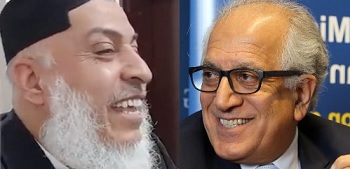Foreign Meddling: US, Taliban Seek to Make Afghan Election Irrelevant
Michael Hughes
August 2, 2019
In 2003, then-U.S. Ambassador to the United Nations Zalmay Khalilzad, with the full backing of the CIA, rendered Afghanistan’s Loya Jirga to a farce by strong-arming aside King Zahir Shah and anointing as president State Department darling Hamid Karzai. Now Zalmay, as special U.S. envoy, is once again guilty of foreign election interference and colluding with Karzai to rig yet another Afghan presidential election.
Khalilzad and Taliban negotiators, who are about to start yet another round of talks in Doha, hope to reach a troop withdrawal agreement by September 1 ahead of Afghanistan’s presidential election which is slated to take place on September 28.
In a July 31 interview with RFE/RL’s Radio Azadi, however, Khalilzad found the nerve to say that Afghanistan should not hold the election until the negotiations are completed. The U.S. congressionally-funded news outlet also uncovered even more dubious designs being spun by State Department planners.
“U.S. officials have privately floated the possibility that the vote could be canceled in the event of a peace settlement and the formation of an interim government that the Taliban would join. There is support among the Taliban and Afghan opposition figures, but President Ashraf Ghani has strongly rejected it,” RFE/RL said in a report published on August 1.
Meanwhile, Khalilzad’s old crony Karzai on the same day demanded that the Afghans postpone the election until a deal is reached with the insurgents. During a press conference in Kabul the former Afghan president said an election would be bad for Afghanistan and the peace process should be prioritized.
The people of Afghanistan are again stuck in the middle because there is no viable option free of foreign influence.
Canceling or postponing the election would signal that Pakistan’s extended expeditionary force, the Taliban, are in full control of who runs the country. On the other hand, Ghani and the other candidates leading the field of 18 have all, to some degree, been preapproved by Washington.
To say this entire sideshow has cast a shadow over the contests of September 28 would be an understatement. Afghan voters are certainly wondering if they should even bother risking life and limb to cast a ballot. The Taliban, in any scenario, will try to make election day hell on earth, but Afghans in the past have braved the onslaught believing their vote might make a difference.
One need look no further than a July 29 Taliban attack on the headquarters of Ghani’s vice presidential running mate, ex-spy chief Amrullah Saleh, which left 20 people dead and 50 injured. Saleh is staunchly opposed to sitting down with the Taliban and has even referred to Afghans willing to negotiate with the insurgents as a “fifth column.”
One could safely place a bet that such attacks – in addition to the prospect of postponing the vote and talk of forming a transitional government – has dampened enthusiasm amongst the electorate.
In addition to Khalilzad’s personal ambitions, the Trump administration wants the election canceled because they know the Taliban will launch an all-out offensive on every polling station in Afghanistan, which would make a mockery of what U.S. officials have advertised as a “peace” agreement.
U.S. President Donald Trump, for his part, may not even realize there is an election planned in Afghanistan. All he cares about is motion towards reducing troop levels so the voting public is under the impression he is withdrawing the United States from endless overseas entanglements. And, supposedly, there is such motion in progress.
On August 1, The Washington Post, citing unnamed officials, reported that the United States has already agreed to cut troop levels from 14,000 to as low as 8,000 immediately if the Taliban agree to sit down with Afghan government officials. This, of course, in addition to Taliban assurances to fight terrorism.
It is almost impossible not to be cynical about this turn of events in light of Trump’s meeting with Pakistani Prime Minister Imran Khan at the White House on July 22, where the two leaders agreed to cooperate on advancing the peace process in Afghanistan.
Four days later the State Department greenlighted a possible $125 million sale for a Technical Security Team to support Pakistan’s F-16 fighter jet program. This was a major coup for Islamabad considering the Trump administration last November suspended $1.66 billion in security assistance to Pakistan for lack of effort in fighting terrorism.
The implications are not too hard to draw: Khan agreed to get the Taliban to reach a deal in exchange for the United States handing Pakistan control of Afghanistan.
All that is left is to decide who will be the figurehead, which makes Khalilzad’s cozying up to the insurgents even more suspicious. In the end, one can easily envision Khalilzad leading Afghanistan’s “transitional” government and eventually crowning himself king.

